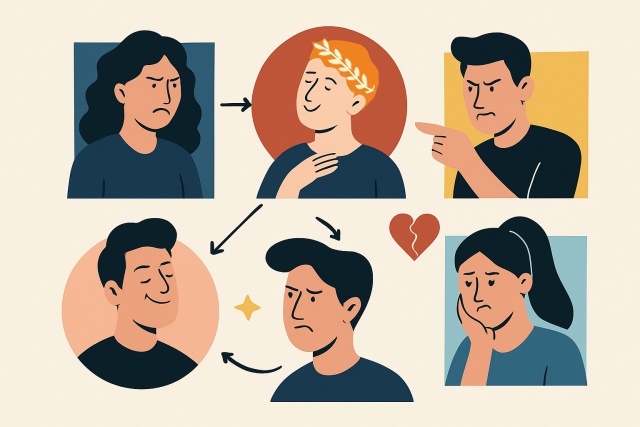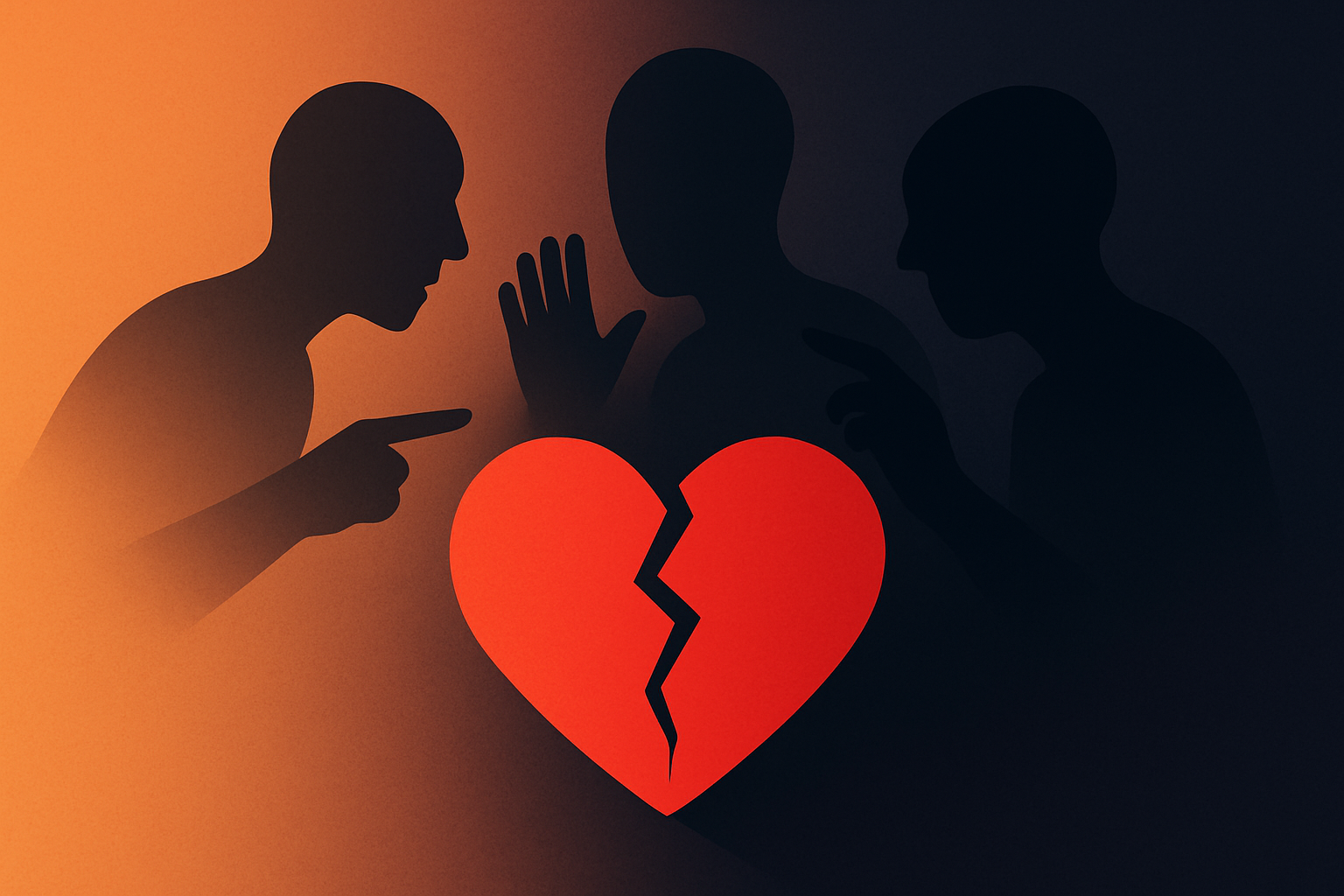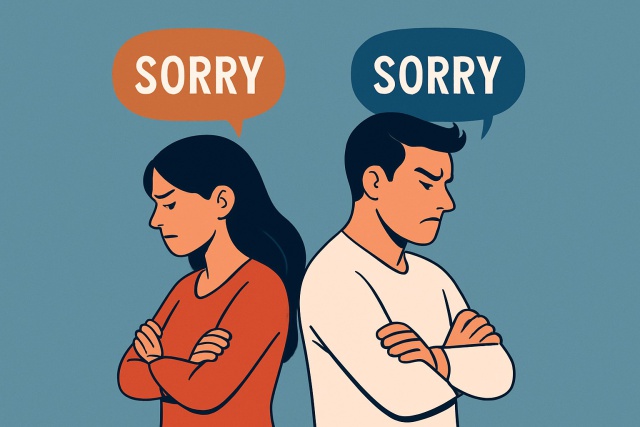
Recognizing Different Types of Narcissists And Their Traits
Narcissism comes in various forms, from overt arrogance to hidden insecurity. This guide breaks down...
Recognizing the toxic relationship signs early on is key because it lets you see when things have taken a turn for the worse, even when you might not realize how much it's wearing you down mentally and emotionally.
A toxic relationship goes beyond typical disagreements or the occasional spat. It is a revolving door of repeated behaviors that chip away at your emotional well-being and cause pain, distress or harm to one or both people in the mess. Unlike the usual ups and downs every relationship endures, toxic ones revolve around persistent patterns of control or disrespect that slowly wear down those involved and leave them feeling drained and stuck.
Sometimes, we tend to overlook the little red flags waving right in front of us when it comes to relationships. Yet, spotting those signs early on can save a lot of heartache down the road. Knowing when a connection is more draining than uplifting isn’t always straightforward, but it’s key for our peace of mind. After all, recognizing the warning signs isn’t about pointing fingers—it’s about taking care of yourself before things spiral out of control.
Catching toxic signs early can really save your mental health and overall well-being. It gives you the insight to figure out whether it is time to set firm boundaries, lean on your support system or walk away from a harmful relationship.
Awareness usually marks the very first step toward breaking free from toxic situations. When you start to spot those unhealthy patterns, it’s like reclaiming a little piece of your peace of mind—giving you the power to steer your well-being back on track and build relationships that truly nurture, not drain.
Toxic behaviors in relationships often creep in quietly at first like a slow drip. Before you know it they start to cause real damage over time.
When a partner frequently criticizes or puts down the other without offering helpful feedback it slowly chips away at self-esteem and creates a toxic atmosphere that is hard to shake off. Unlike constructive advice which can be a real lifesaver constant criticism tends to gnaw away at confidence and often comes wrapped in sarcasm or outright disdain.
Toxic partners tend to nitpick about who you hang out with or what you choose to wear. They can even try sneaking their way into your thoughts. Sometimes this control isn’t loud or obvious. It creeps in through guilt trips or passive-aggressive comments.
Let's dive into the tricky waters of gaslighting and manipulation—those sneaky tactics that can leave anyone feeling like they have lost their grip on reality. It is not just about blatant lies; often, it is the subtle twists and turns in conversations that slowly chip away at our sense of trust in ourselves and others. Getting a handle on these behaviors is like shining a light in a dark room—you start seeing things more clearly and can protect yourself before the damage really sets in.
Gaslighting is a harmful tactic where one partner makes the other question their own reality or feelings. It often appears as denial of facts, unfairly blaming you or minimizing everything you have been through like it is no big deal. For instance, if you open up about being hurt and your partner brushes it off by saying you are "too sensitive" or "just making things up," that is a textbook case of gaslighting.
A little jealousy now and then is normal but when it spirals out of control it often crosses the line and stirs up distrust. A toxic partner might start accusing you without reason, keep a hawk-like eye on your every step or try to isolate you from friends and family. This kind of possessiveness puts a straitjacket on your independence, cranks up anxiety and chips away at your social life.
Toxic relationships have a knack for dodging real issues. You’ll often see this play out as stonewalling or the cold shoulder and casually sweeping your worries under the rug.
When a partner oversteps your physical, emotional or digital boundaries—like sneaking a peek at your phone without a heads-up or nudging you to share more than you are comfortable with—it usually signals a breakdown in respect and control that can seriously damage the trust you have built.
Sometimes, people just can’t seem to show up emotionally, and it can feel like chasing smoke—no matter how hard you try, they’re always just out of reach. Emotional unavailability paired with inconsistency can leave you wondering where you stand, turning what should be a simple connection into a confusing rollercoaster ride. It’s one of those situations where you find yourself hoping they’ll open up, but more often than not, you’re stuck picking up the pieces of silent treatments, mixed signals, and unpredictable moods. Trust me, it’s as exhausting as it sounds, and it’s a stumbling block that can wreck even the most promising relationships.
A partner who’s emotionally unavailable often shies away from getting close and finds it tough to show empathy. They pull back right when you need them most. When their mood or behavior swings from warm and loving one minute to cold and distant the next, things get confusing and unstable.

Assessing how healthy your relationship is means taking an honest look at your feelings and noticing any negative patterns that keep popping up. You should also tune in to what trusted friends or professionals might have to say. Signs like feeling emotionally drained, dealing with a dip in self-esteem or living in a state of fear often throw up red flags for a toxic dynamic.
When you notice toxic warning flags in your relationship, it’s important to handle things gently and with support. The first step is to face the issue head-on because sweeping it under the rug drags out healing. Be open about your feelings and don’t be shy about setting firm boundaries. Lean on friends, counselors or professionals for perspective and advice.
There are plenty of myths swirling around toxic relationships, such as the idea that toxicity only shows up as physical abuse or that a toxic relationship must end immediately. Toxicity comes in all shapes and sizes, and understanding that its intensity can vary—and therefore needs different approaches—really helps untangle the mess.
Recognizing the toxic relationship signs gives you the insight needed to make healthier choices, honor your self-respect and safeguard your mental well-being.
Normal rough patches tend to be just that—temporary bumps in the road that get smoothed out with a bit of respect and effort. Toxic relationships are a whole different ballgame with ongoing harmful patterns like constant criticism or manipulation that don’t just go away. If negativity feels like the default setting and leaves you drained or questioning your worth and your boundaries are ignored repeatedly, it’s probably not just a bad day—it leans more toward a toxic situation.
Well, it really boils down to how deep the problems run and whether both people are genuinely committed to change. When toxic behaviors are identified and both partners commit to professional help like couples therapy, things can improve. But if abuse is involved, accountability is missing, or no real effort is made to get better, prioritizing your safety and sanity by walking away often is the smartest move.
Gaslighting is a sneaky tactic that makes you second-guess what you remember or feel. Examples include your partner flat-out denying something they clearly said, brushing off your feelings with lines like "You’re too sensitive" or flipping events so you end up holding all the blame. This manipulation chips away at your trust in yourself and nudges you to lean more on their version of reality.
Absolutely, feeling guilty is common, especially if your partner reacts poorly. But remember—boundaries are a healthy and necessary part of any relationship because they safeguard your well-being. Usually that guilt fades with time and practice. A respectful partner will honor your limits while a toxic one will push back, which proves why those boundaries are so important.
The first step is to acknowledge the problem without beating yourself up over it. Then reach out to a trusted friend, family member, or therapist for perspective and support. Getting that validation often clears the fog before you decide what’s next, like having an honest conversation with your partner or setting firmer boundaries.

Narcissism comes in various forms, from overt arrogance to hidden insecurity. This guide breaks down...

Intimacy disorder disrupts the ability to connect emotionally and physically, often causing confusio...

Are narcissistic apologies genuine or just manipulative tactics? This article unpacks the truth behi...

Insecurities impact relationships quietly but deeply. Learn about common types, how they develop, an...